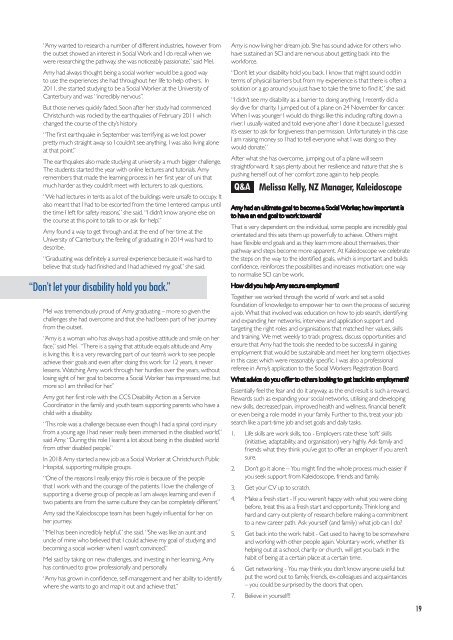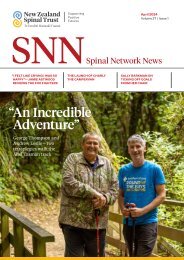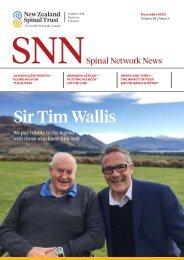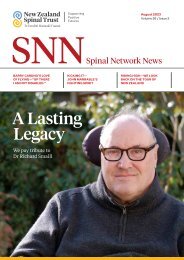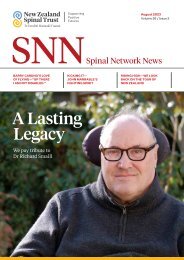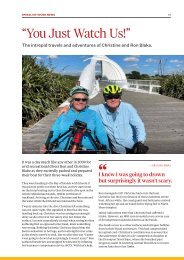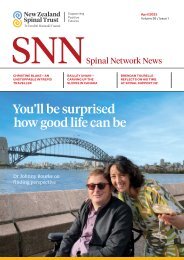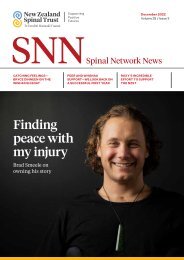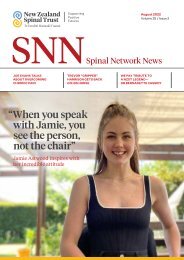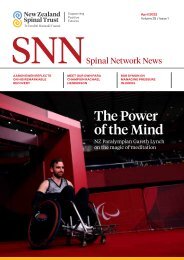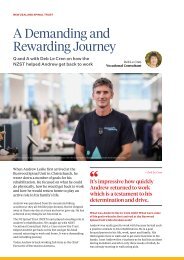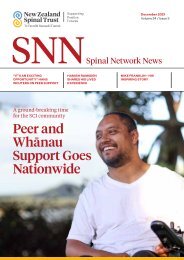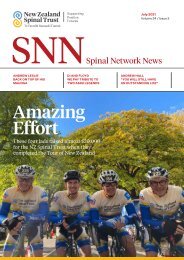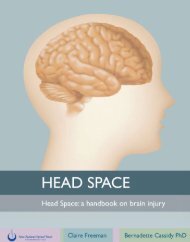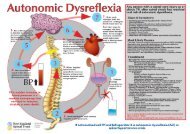SNN December 2018
Create successful ePaper yourself
Turn your PDF publications into a flip-book with our unique Google optimized e-Paper software.
“Amy wanted to research a number of different industries, however from<br />
the outset showed an interest in Social Work and I do recall when we<br />
were researching the pathway, she was noticeably passionate,” said Mel.<br />
Amy had always thought being a social worker would be a good way<br />
to use the experiences she had throughout her life to help others. In<br />
2011, she started studying to be a Social Worker at the University of<br />
Canterbury and was “incredibly nervous”.<br />
But those nerves quickly faded. Soon after her study had commenced<br />
Christchurch was rocked by the earthquakes of February 2011 which<br />
changed the course of the city’s history.<br />
“The first earthquake in September was terrifying as we lost power<br />
pretty much straight away so I couldn’t see anything. I was also living alone<br />
at that point.”<br />
The earthquakes also made studying at university a much bigger challenge.<br />
The students started the year with online lectures and tutorials. Amy<br />
remembers that made the learning process in her first year of uni that<br />
much harder as they couldn’t meet with lecturers to ask questions.<br />
“We had lectures in tents as a lot of the buildings were unsafe to occupy. It<br />
also meant that I had to be escorted from the time I entered campus until<br />
the time I left for safety reasons,” she said. “I didn’t know anyone else on<br />
the course at this point to talk to or ask for help.”<br />
Amy found a way to get through and at the end of her time at the<br />
University of Canterbury, the feeling of graduating in 2014 was hard to<br />
describe.<br />
“Graduating was definitely a surreal experience because it was hard to<br />
believe that study had finished and I had achieved my goal,” she said.<br />
“Don’t let your disability hold you back.”<br />
Mel was tremendously proud of Amy graduating – more so given the<br />
challenges she had overcome and that she had been part of her journey<br />
from the outset.<br />
“Amy is a woman who has always had a positive attitude and smile on her<br />
face,” said Mel. “There is a saying that attitude equals altitude and Amy<br />
is living this. It is a very rewarding part of our team’s work to see people<br />
achieve their goals and even after doing this work for 12 years, it never<br />
lessens. Watching Amy work through her hurdles over the years, without<br />
losing sight of her goal to become a Social Worker has impressed me, but<br />
more so I am thrilled for her.”<br />
Amy got her first role with the CCS Disability Action as a Service<br />
Coordinator in the family and youth team supporting parents who have a<br />
child with a disability.<br />
“This role was a challenge because even though I had a spinal cord injury<br />
from a young age I had never really been immersed in the disabled world,”<br />
said Amy. “During this role I learnt a lot about being in the disabled world<br />
from other disabled people.”<br />
In <strong>2018</strong> Amy started a new job as a Social Worker at Christchurch Public<br />
Hospital, supporting multiple groups.<br />
“One of the reasons I really enjoy this role is because of the people<br />
that I work with and the courage of the patients. I love the challenge of<br />
supporting a diverse group of people as I am always learning and even if<br />
two patients are from the same culture they can be completely different.”<br />
Amy said the Kaleidoscope team has been hugely influential for her on<br />
her journey.<br />
“Mel has been incredibly helpful,” she said. “She was like an aunt and<br />
uncle of mine who believed that I could achieve my goal of studying and<br />
becoming a social worker when I wasn’t convinced.”<br />
Mel said by taking on new challenges, and investing in her learning, Amy<br />
has continued to grow professionally and personally.<br />
“Amy has grown in confidence, self-management and her ability to identify<br />
where she wants to go and map it out and achieve that.”<br />
Amy is now living her dream job. She has sound advice for others who<br />
have sustained an SCI and are nervous about getting back into the<br />
workforce.<br />
“Don’t let your disability hold you back. I know that might sound odd in<br />
terms of physical barriers but from my experience is that there is often a<br />
solution or a go around you just have to take the time to find it,” she said.<br />
“I didn’t see my disability as a barrier to doing anything. I recently did a<br />
sky dive for charity. I jumped out of a plane on 24 November for cancer.<br />
When I was younger I would do things like this including rafting down a<br />
river. I usually waited and told everyone after I done it because I guessed<br />
it’s easier to ask for forgiveness than permission. Unfortunately in this case<br />
I am raising money so I had to tell everyone what I was doing so they<br />
would donate.”<br />
After what she has overcome, jumping out of a plane will seem<br />
straightforward. It says plenty about her resilience and nature that she is<br />
pushing herself out of her comfort zone again to help people.<br />
Q&A<br />
Melissa Kelly, NZ Manager, Kaleidoscope<br />
Amy had an ultimate goal to become a Social Worker, how important is<br />
to have an end goal to work towards?<br />
That is very dependent on the individual, some people are incredibly goal<br />
orientated and this sets them up powerfully to achieve. Others might<br />
have flexible end goals and as they learn more about themselves, their<br />
pathway and steps become more apparent. At Kaleidoscope we celebrate<br />
the steps on the way to the identified goals, which is important and builds<br />
confidence, reinforces the possibilities and increases motivation; one way<br />
to normalise SCI can be work.<br />
How did you help Amy secure employment?<br />
Together we worked through the world of work and set a solid<br />
foundation of knowledge to empower her to own the process of securing<br />
a job. What that involved was education on how to job search, identifying<br />
and expanding her networks, interview and application support and<br />
targeting the right roles and organisations that matched her values, skills<br />
and training. We met weekly to track progress, discuss opportunities and<br />
ensure that Amy had the tools she needed to be successful in gaining<br />
employment that would be sustainable and meet her long term objectives<br />
in this case; which were reasonably specific. I was also a professional<br />
referee in Amy’s application to the Social Workers Registration Board.<br />
What advice do you offer to others looking to get back into employment?<br />
Essentially feel the fear and do it anyway, as the end result is such a reward.<br />
Rewards such as expanding your social networks, utilising and developing<br />
new skills, decreased pain, improved health and wellness, financial benefit<br />
or even being a role model in your family. Further to this, treat your job<br />
search like a part-time job and set goals and daily tasks.<br />
1. Life skills are work skills, too - Employers rate these ‘soft’ skills<br />
(initiative, adaptability, and organisation) very highly. Ask family and<br />
friends what they think you’ve got to offer an employer if you aren’t<br />
sure.<br />
2. Don’t go it alone – You might find the whole process much easier if<br />
you seek support from Kaleidoscope, friends and family.<br />
3. Get your CV up to scratch.<br />
4. Make a fresh start - If you weren’t happy with what you were doing<br />
before, treat this as a fresh start and opportunity. Think long and<br />
hard and carry out plenty of research before making a commitment<br />
to a new career path. Ask yourself (and family) what job can I do?<br />
5. Get back into the work habit - Get used to having to be somewhere<br />
and working with other people again. Voluntary work, whether it’s<br />
helping out at a school, charity or church, will get you back in the<br />
habit of being at a certain place at a certain time.<br />
6. Get networking - You may think you don’t know anyone useful but<br />
put the word out to family, friends, ex-colleagues and acquaintances<br />
– you could be surprised by the doors that open.<br />
7. Believe in yourself!!<br />
19


